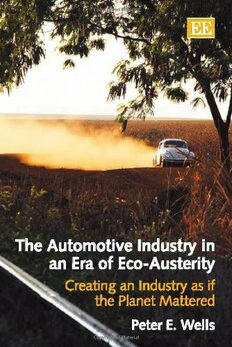
The Automotive Industry in an Era of Eco-Austerity: Creating an Industry As If the Planet Mattered PDF
213 Pages·2010·1.486 MB·English
Most books are stored in the elastic cloud where traffic is expensive. For this reason, we have a limit on daily download.
Preview The Automotive Industry in an Era of Eco-Austerity: Creating an Industry As If the Planet Mattered
Description:
`A splendid analysis of how an automotive industry based on mass production has become an alien in our time - where diversity and personalised products and services have become the norm. Peter Wells presents an intriguing analysis of how the automotive industry can find ways forward and re-invent itself. A must read for all interested in sustainable mobility, as well as strategists in the automotive industry.' - Arnold Tukker, TNO Built Environment and Geosciences, The Netherlands `The Automotive Industry in an Era of Eco-Austerity examines how we can achieve sustainable personal mobility, using a wide range of ideas and concepts. As the author stresses, this is not about the search for the best single technology for developing a sustainable car - it is much wider than that. Rather this book is about the fact that fundamental change is needed. Anyone interested in the auto industry should read it - much recommended.' - David Bailey, Coventry University, UK `What the global automotive industry needs right now is ideas and this book is packed with them. Dr Wells is a master of turning a topic on its head in order to approach it from an angle that is both unique and enlightening. This book should be required reading for decision makers within the automakers, suppliers and governments, whose job it will be to shape the auto industry of tomorrow.' - Gareth Owen Davies, AutomotiveWorld.com The Automotive Industry in an Era of Eco-Austerity analyses the future prospects of the largest manufacturing sector in the world, the automotive industry, at a time of unprecedented global financial crisis and unrelenting environmental pressure. This unique book seeks to combine economic analysis with the environmental research to arrive at a comprehensive understanding of the forces that shape change in the automotive industry. It eschews the usual focus on technologies, and gives more attention to the impact of change on the business models and strategies adopted by the vehicle manufacturers, the scope for new entrants, and the implications for policy-makers. This richly textured book concludes that the achievement of a sustainable automotive industry will not be possible with `one best way', but that myriad technologies and business concepts, grounded in the distinct needs of different places and consumers, will be the basis of the future of mobility. Drawing on a wealth of industry data by virtue of the authors' record of many years researching the industry, this book will be invaluable to both students and researchers working within transport, industrial ecology, automobility, industrial policy, economics, regional development, sustainability, technology, and business models.
See more
The list of books you might like
Most books are stored in the elastic cloud where traffic is expensive. For this reason, we have a limit on daily download.
